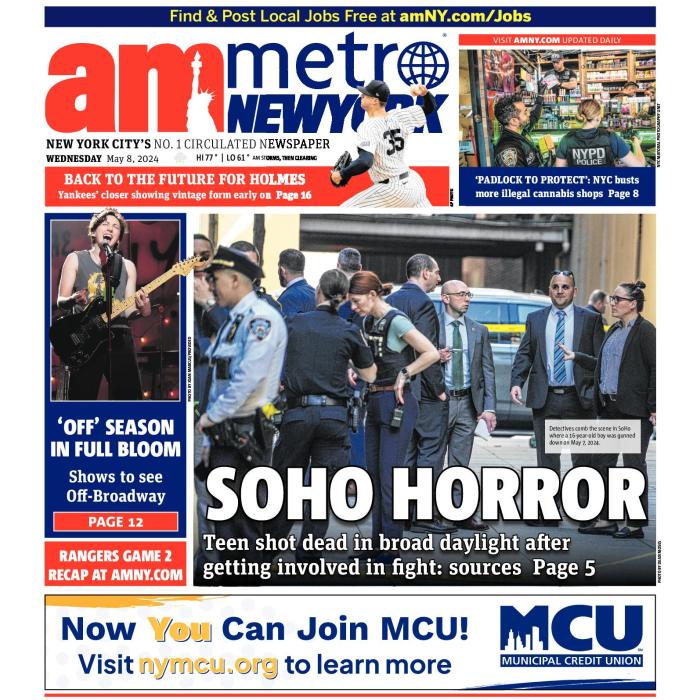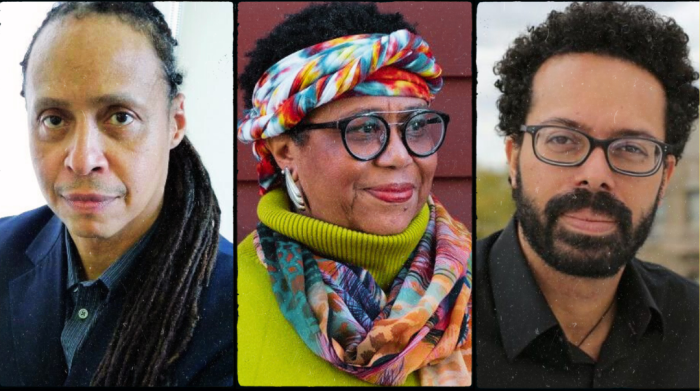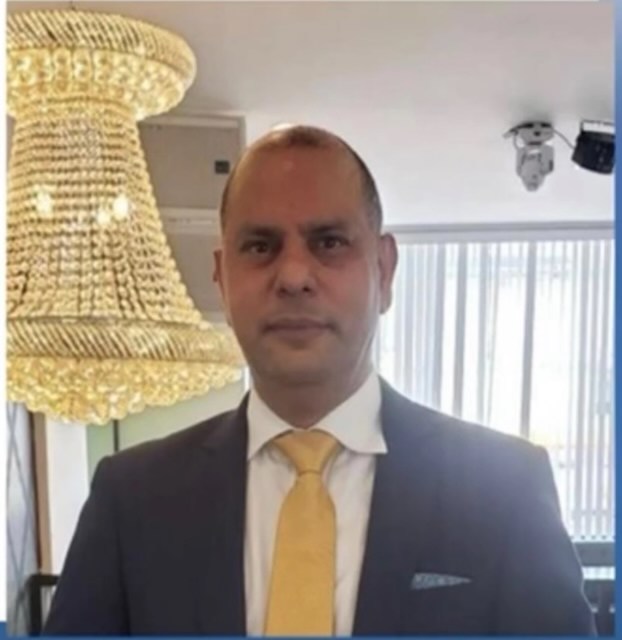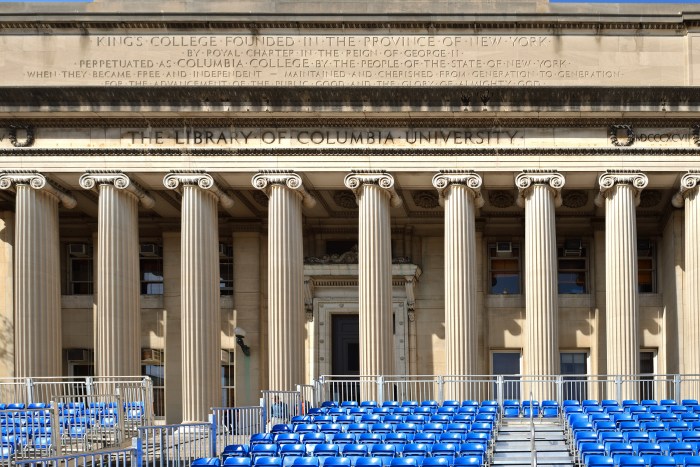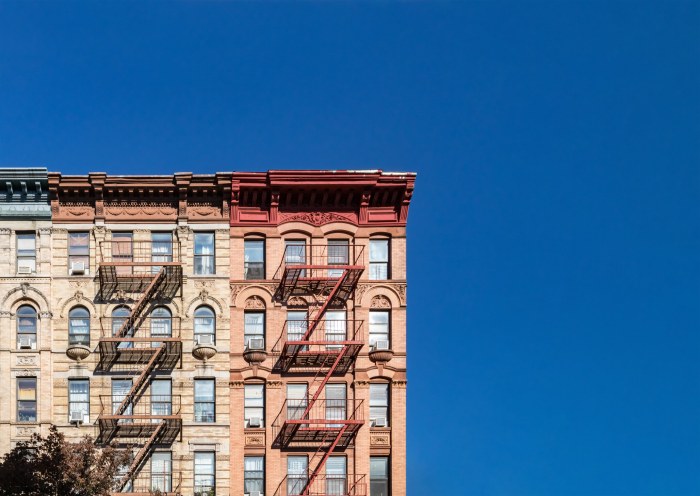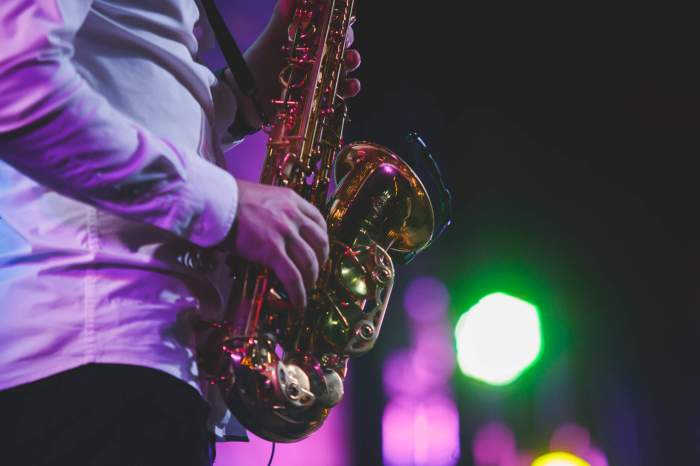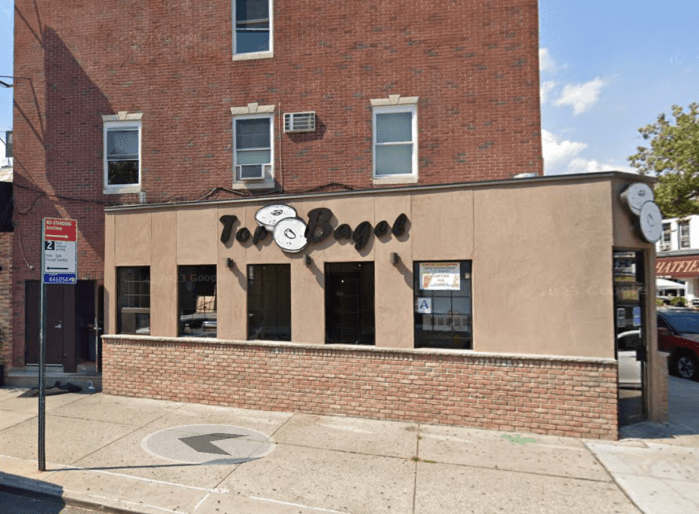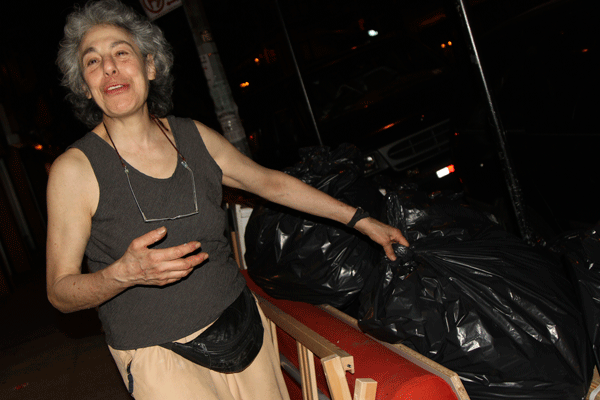 [/media-credit]
[/media-credit]
- Vicki Rovere scavenging for things to give away on the Lower East Side.
BY CLAYTON PATTERSON | Anyone who has spent any length of time on Ludlow between Rivington and Houston Sts. is familiar with the “free stuff” that keeps appearing on whatever space is available to hang used clothes and rest cardboard boxes full of old books, kitchen utensils and other various knickknacks one would typically find on the shelves of a Goodwill store.
Since people are aware of the fact that I know what’s going on in my area of the Lower East Side, I am often asked, “What is this free stuff about? Is it an art project? Who is doing this and why?”
The answer is Vicki Rovere. Vicki, a native New Yorker, grew up in Brooklyn, and moved to 153 Ludlow St. in 1973.
Recently her location was the chain-link fence gate that keeps people from entering the property of the botched hotel construction site at 179 Ludlow. She has since moved to her current location, which is the scaffolding in front of 149 Ludlow. She does not ask permission to use the places she chooses. She just squats the space.
Vicki is a self-sufficient, independent, practical and politically motivated person, who survives by her wits and her hard work.
As for how she makes a living, she said, “Some, not most, of my income comes from selling the things I’ve scavenged — mostly books, on the Internet. It’s never been a primary source of income, but one of my income trickles. Other sources are my button business and the work I do as a clutter consultant.”
Over the years she has sold her found objects at flea markets and stoop sales, as well as to vintage clothing and collectible stores. She manufactures her own buttons and pins with messages and slogans that are antiwar, anti-Bush and pro-feminist and environmental. She sells the buttons at demonstrations and by mail order.
Vicki has also self-published two books, “Worn Again: A Guide to New York City’s Thrift Shops & Other Treasure Troves” and “Where to Go: A Guide to Manhattan’s Toilets.” She did everything herself — the research, writing, production, advertising and distribution.
The reason most people never see her is because of the unusual hours she keeps. Normally she goes to bed around 7 a.m., and gets up at 2 p.m. Two hours of her day are spent scavenging the streets for discarded treasures she can fit into her wheeled suitcase. Usually she puts out her goods after dark. She tries to clean up her squatted spot by 1 a.m.
A couple of years ago she told me all the time she spent walking the streets and schlepping her shopping cart full of found treasure behind her took a toll on her body, especially on her knees and back. Not that she stopped hitting the trail, but she also has other things to do.
For the last few months, Josh Raab, a young photography student has been making a documentary on Vicki’s street activities. Check out https://www.youtube.com/watch?v=hJBgVI1SxMc&feature=youtu.be .
Finding and selling is only a part of the reason why she does what she does.
“It’s a thumb in the eye to the developers and the consumer culture,” she explained. “It builds community. My customers are immigrant families, homeless people, artists, young people who come to the clubs, other political activists, etc. It serves as an exhibit of how wasteful our society is, as well as offering an alternative to it.
“Because it’s brought me into contact with all these different categories of folks that I otherwise wouldn’t mix with much, it makes me feel much more a part of the larger community and even a bit more, well, spiritual. I have to keep explaining to the people who say, ‘God bless you’ that I’m an atheist!
“And recycling helps protecting the environment by saving space in the landfills,” she added. “Recycling not only saves space in the landfill, it saves the fuel burned by the trucks that haul it away, saves wear and tear on the bodies of the workers who toss the bags into the trucks, saves the raw materials and energy that would be used to replace the items that are thrown away.”
Vicki is becoming the last of a dying breed. It used to be a common site on the Lower East Side to see street pickers. People who survived by selling what they were able to salvage off the sidewalk. Gentrification and all the new Bloomberg laws that come with making a “better” city have all but ended that public service.
It is now illegal for a private person to pick up and collect metal off the street. I think this is one more of Bloomberg’s wars against the poor and the working class: his attempt to make New York City a place that only the rich and the privileged can afford to live in. When I was a kid and needed money for the weekend, one thing I did was got out on a scavenger hunt for discarded car batteries, which were filled with lead and car radiators filled with cooper. The scrapyard paid good money for both of these metals and I was set for the weekend.
